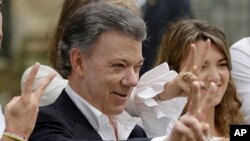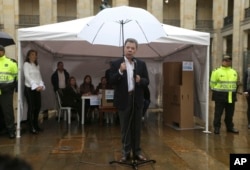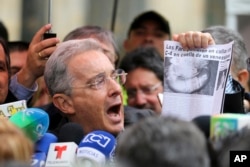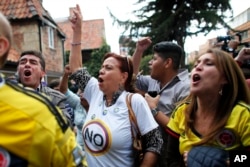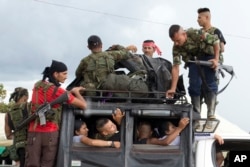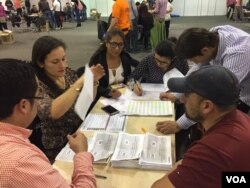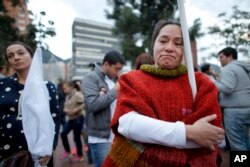Colombian President Juan Manuel Santos says he is not giving up on peace after Sunday's stunning defeat of a referendum on a treaty with FARC rebels.
Voters narrowly rejected the deal 50.2 percent to 49.7. Public opinion polls going into Sunday's voting forecast the referendum would pass overwhelmingly.
Santos went on Colombian television to accept defeat of the referendum, but refused to declare that peace with the rebels is dead.
"I will not give in and I will continue to seek peace to the last day of my mandate," he said.
Santos ordered his negotiators to return to Havana, Cuba, where four years of peace talks had taken place. Santos reassured the nation that the cease-fire with the rebels will remain.
The leader of the Revolutionary Armed Forces of Colombia, Rodrigo Londono, who is also known as Timochenko, is also refusing to give up.
"To the Colombian people who dream of peace, count on us. Peace will triumph."
He is also expected to return to Havana.
Supporters of both sides took to the streets of Bogota after the results of the referendum were announced. The "no" celebrated while a group of "yes" voters, dressed in white from head to toe, gathered outside President Santos' home.
The peace agreement signed last week was aimed at formally ending the 52 year-old uprising by the leftist rebels. The guerrilla war in Colombia has killed more than 220,000 people and driven millions from their homes.
The Santos government had waged a fierce campaign in favor of the peace deal, appealing to the millions of Colombians who say they are sick of war and violence and terrorism.
But the "no" side, led by Santos' chief political rival, former President Alvaro Uribe, campaigned just as vigorously against the deal.
Many "no" voters were genuinely offended that nearly all FARC rebels will avoid prison time for crimes allegedly committed during the uprising and get various financial support from the government..
They are also upset that FARC would be guaranteed seats in the Colombian congress without an election in exchange for transforming FARC into a political party.
Timochenko had publicly asked for forgiveness for whatever harm was committed by the rebels during the long uprising.
The FARC rebellion began as a simple peasant uprising in 1964 and soon grew into a major threat to various Colombian obtainments over the next five decades.
“No more war,” declared President Santos in his remarks following Timochenko. “I welcome you to democracy, change weapons for votes and weapons for ideas.”
The conflict since the mid-1960s displaced millions of people and left more than 250,000 dead.
The FARC has agreed to cooperate with de-mining, an effort being led by the United States and Norway.
It used drug trafficking as a major source of funding. Kidnapping politicians and foreigners and holding them hostage in remote jungle hideouts was a FARC trademark.
The United States spent billions of dollars in military aid to help the Colombian government combat FARC and bring it to the negotiating table.
VOA's Steve Herman in Washington contributed to this report.




